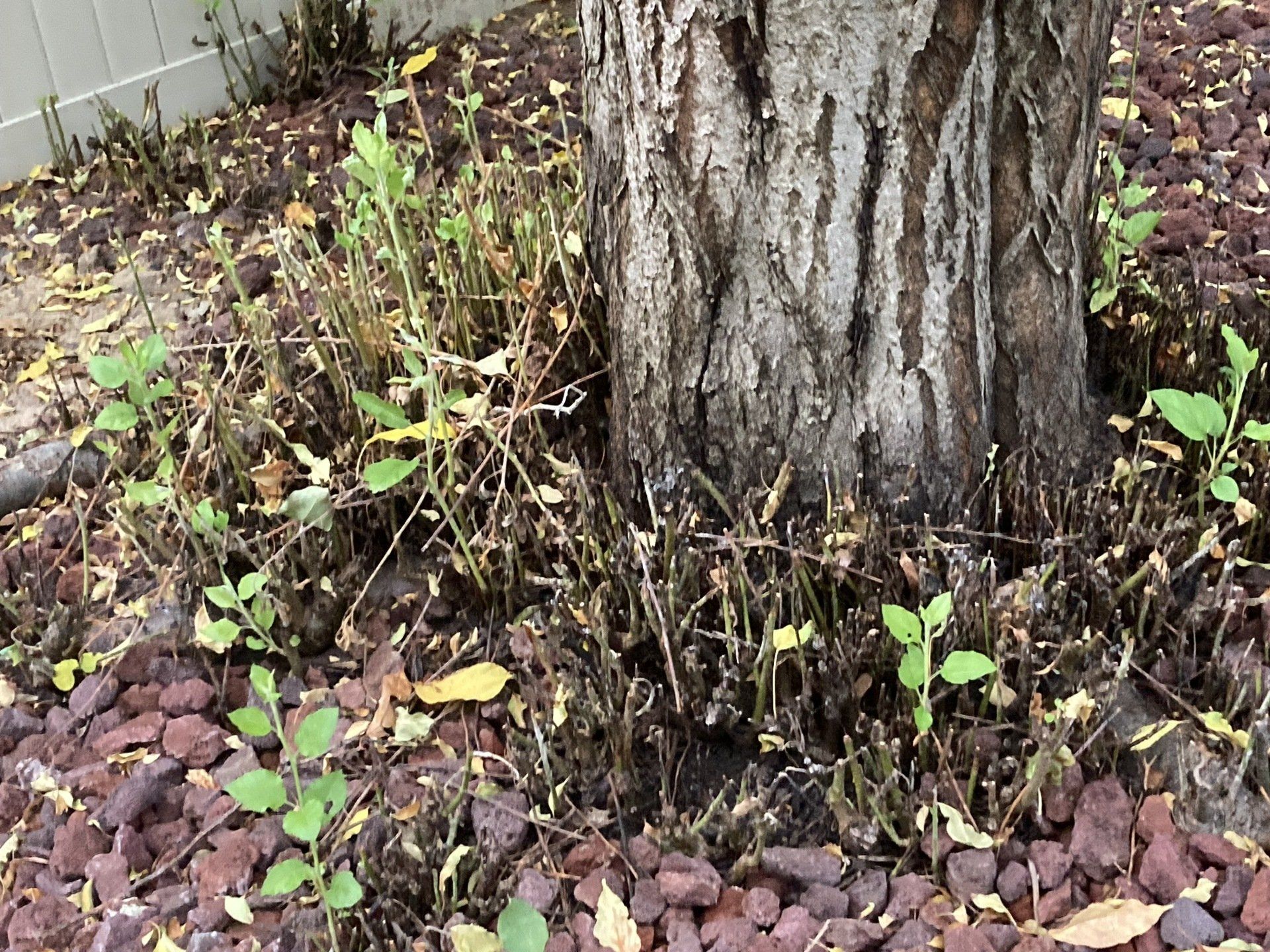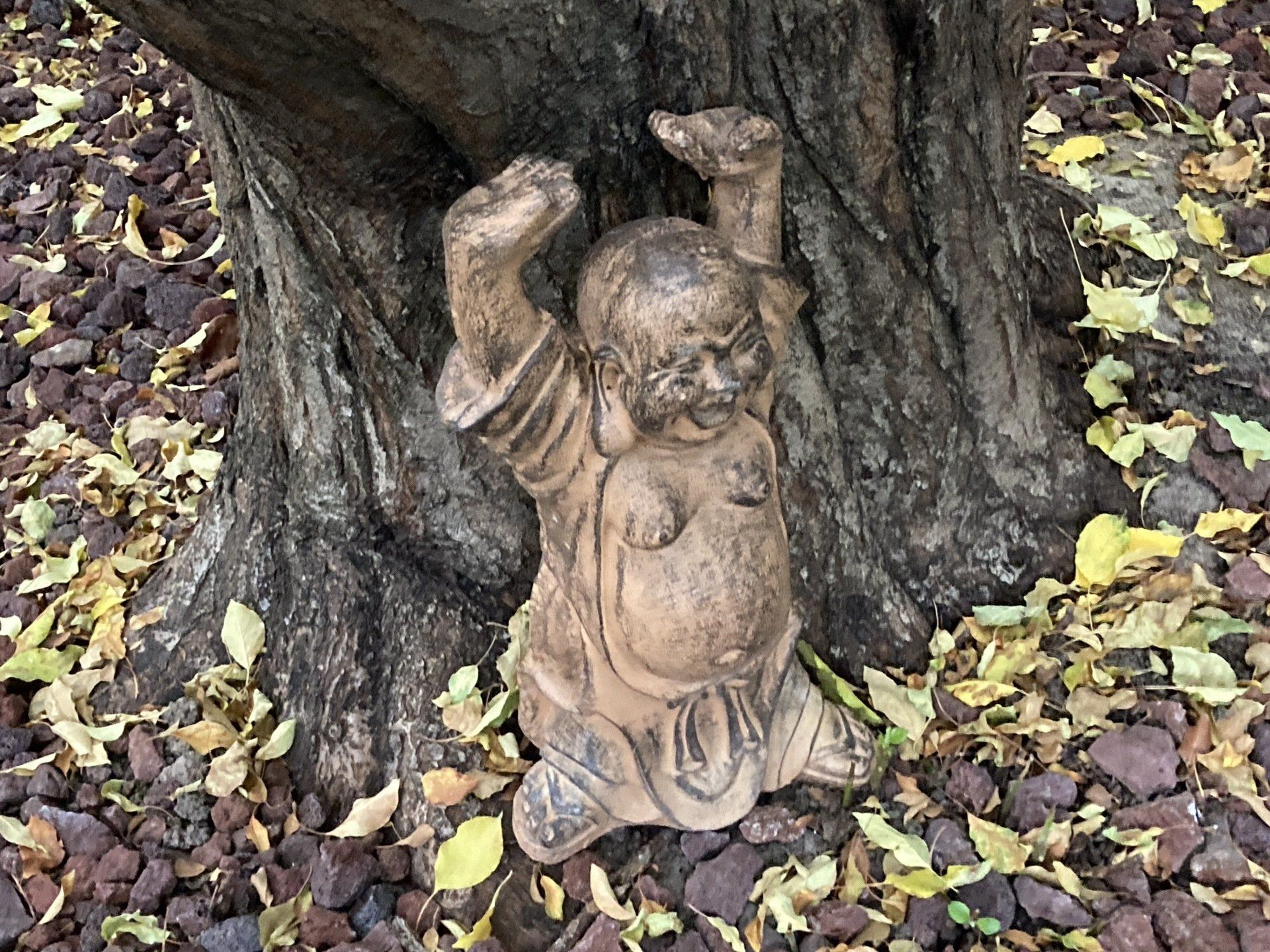Weeds and Suckers
"The proof in the pudding comes when we learn by doing."
Moving the Buddha
To cut the weeds grown ‘round him
Now I move St. Francis

It is always amusing to imagine famous people contending with what just folks like us have to deal with. The battle with weeds or a finicky weed whacker. Cutting tree suckers time and time again (“I want to live!”, they cry.). The interminable wait room at the DMV. The vulnerability of a visit to the doctor’s office. We’re all human and while some can mitigate the inconveniences of life, no one can avoid having a digestive system that might not be working well today. In the middle of a meeting.
It took me a long time to realize that those ordinary moments, those daily difficulties, are often where significant learning can occur. We know that happens in younger years, when mom teaches patience, or coach Joan requires her athletes to be on time, or Scoutmaster Dave has a conversation with one of the Scouts who is not helping out.
The teachability-potential of those moments is no different for adults, but we often only have ourselves to guide us. No parent, teacher, or coach is hovering over us to give us direction. While we have significant others – friends, colleagues, bosses, spouses – who can influence us, each of us determines whether the many little opportunities for learning are harvested or lay fallow. Whether they are just little obstacles to get past or occasions to practice deepening skills and attitudes.
Individually, those learning opportunities seem unimportant, but over time they compound and cumulatively can result in something wonderful.
Recently, I participated in a momentous occasion for a doctoral student, as she defended her dissertation. Imagine, if you will, the sticktoitiveness it took for her to take classes, eschew time otherwise spent on career, family, friends, or just dusting the house for, say, five years. And the real willpower came – comes for most – after the classes had been taken, and the pilgrim steps forth on her own, researching something of import that no other person has completed before. At a doctoral defense, the student should know more about the subject of her research than anyone else in the world. At that time, no one has delved into that particular research question more. Others will build on what she learned, making their own contributions, but for that moment (and with continuing effort perhaps over a scholarly career) she is “the” expert, having set foot where others have not yet trod.
That newly minted doctor worked through countless little and not-so-little tasks to achieve her goal. When I pondered pursuing a doctorate I told my dad, who had been a professor for many years, that I didn’t know if I was smart enough to do it. He told me I was smart enough, and the reason most people succeed or fail as doctoral students is their ability to persevere.
Years later, I believe that wholeheartedly. Once someone has been accepted into a doctoral program, they are likely to have the intellectual ability to complete the work. In large measure, the rest depends on tenacity. Taking a step, and then another, and then another. Overcoming obstacles. Sticking with it. It's true for any meaningful endeavor in life, I think.
...Lewis and Clark. (Do you see the ocean yet?)
...Writing a dissertation. (What's up, Doc?)
...Learning any artistic skill. (Well, I think Bob Ross gave me some good ideas this time.)
...Name your craft, profession, or expertise. (Dance, law, building ships in bottles.)
...Let's put on a show! (Yay Mickey and Judy!)
We do learn by observing others, by reading too, but the proof in the pudding comes when we learn by doing. By giving it a try. Then by practicing just a bit, or more than just a bit, daily or regularly. And when we can do that even when someone cuts us off in traffic or when someone gets the food order wrong, we build those qualities of character that take us to the starting line at Boston Marathon or to the first book we wrote. Or a suckerless, weedless, yes even beautifully manicured,yard.
At least for this week.
__________________________________________________________________________
“Since you have asked me how one should set about to acquire the treasure of knowledge, this is my advice to you concerning it: namely, that you should choose to enter, not straightway into the ocean, but by way of the little streams; for difficult things ought to be reached by way of the easy ones.”
~St. Thomas Aquinas, How to Study, from White, V. (1944) p. 3
Sources
White, v. (1944). The letter of Saint Thomas to Brother John—"de modo studendi". The life of the spirit (1944-1946), 1(10), 163-180. Retrieved September 18, 2021, from http://www.jstor.org/stable/43702009











